
In 2020, COVID-19 spread across the world in what has been an unprecedented global health crisis. The following 24 months have seen people’s lives change drastically, from the way we socialize to travel and work. Businesses were forced to rapidly adapt to the changing world by adopting new ways of working, while other employees were left furloughed and uncertain of their professional future. These challenges thrust Human Resources (HR) employees into the limelight and changed employee management forever.
COVID-19 has elevated the importance of HR. Chief human resource officers (CHRO) and HR leaders have been tasked with figuring out how employees can effectively work from home, provide extra mental and physical support, and generally find new ways to keep their organization operating. Even as the dust begins to settle and we move finally towards a post-COVID world, the role of the HR professional has been transformed. As we look forward to the year ahead, Cloudbooking examines the top 10 HR trends of 2022 and CHRO priorities.
HR trends to prepare for in 2022
HR has always been an integral part of the business world, but in this new world of flexibility, digitization, and modern challenges, there is a new level of importance placed on HR. HR will have the important role of being responsible for defining and developing new skills and processes while also ensuring that employees are engaged, happy, and healthy. Let’s take a look at what to expect from the world of HR and the potential HR trends of 2022.
1. Managing the transition from work-from-home to hybrid work
There have been many major transitions and periods of adaptation; however, few were as big as the transition to working from home. Workers managed with their makeshift offices and day-to-day interruptions. However, after over 18 months of working from home, many workers have become used to the increased flexibility and freedom they get from working from home. In fact, Cloudbooking found that 55% of respondents want a mix of office and home-based work, while 9% want a mix of home, office, and approved public, and co-working spaces.
The hybrid work model has become a popular solution to this problem and looks here to stay. This workplace model poses its own challenges for HR professionals who will have to develop and write new hybrid policies, get to grips with supporting and connecting with employees virtually through communication software, adjust employee experience strategies, and consider how performance and employee evaluations will work in a remote context.
2. The great resignation: disgruntled workers have had enough
2021 saw the term “The Great Resignation” become a hot topic across the business world. It describes the higher-than-normal quit rate of workers that began in the spring of 2021, which many people put down to the COVID-19 pandemic, and an economic and psychological shift in employees.
After surveying 6,000 workers, the recruitment firm, Randstad UK, found that 69% felt confident they would be moving to a new role in the next few months. This upheaval of the job market has created work for HR professionals, who are tasked with finding ways to improve employee engagement and satisfaction and also the onboarding and offboarding of millions of workers on the move.
3. Sharp focus on employee well-being and experience
Organizations worldwide have realized that employee well-being is key to future productivity and success. Out of 603 employees, 62% identified well-being benefits as a major factor in deciding whether to apply for a new job.
With hybrid and remote working, it can be difficult to switch off and achieve an optimal work-life balance. When you add this to the trauma of the coronavirus pandemic and the general stressors of life, it is easy to see why well-being is becoming a hugely important focus within business, and particularly, HR.
4. HR transparency
Transparent communication will become one of the most important HR trends and aspects of any organization in 2022. Employees expect transparency and clarity when communicating the implementation of post-COVID policies and processes. This transparency in the day-to-day running of the business also helps employees feel more included and has even been found to increase productivity.
5. Digital transformation of the workplace
Thanks to the rise of hybrid and flexible working, the conventional workplace as we know it is being transformed. Smart workplaces, where technology and analytics enable employees to work faster and smarter, will continue to be a major HR trend in 2022. This digitization of the workplace has seen a range of software and technology become essential parts of the modern office:
- Workplace management software
- Desk booking software
- Meeting room booking software
- Visitor management
- Car park management
- Intelligent climate control systems
- Cloud-based technology.
Workplace management systems, like ours at Cloudbooking, play an essential role in the safe and successful return to the post-covid workplace and in the adoption of hybrid working that many organizations are embracing.
6. Need for diversity and inclusion (D&I) ramps up
Diversity and inclusion in the workplace are about valuing each employee as an individual, a topic that looks set to be one of the bigger HR trends in 2022. Having a more diverse and inclusive workforce helps build a healthy workplace culture that attracts talent from all over the world and improves employee retention.
And as only 44% of employees say their organization’s diversity and inclusion efforts feel sincere, while even fewer (34%) feel they are effective, it is no wonder that HR professionals will play an integral role in developing new D&I strategies.
7. Skills shortage calls for new training initiatives
Thanks to the increasing adoption of technologies, such as AI and “the internet of things,” it is likely that we will see huge structural changes in the UK’s workforce. Add the issue of aging populations and an aging workforce, and we are set for a huge skills shortage.
We expect to see UK companies responding to this approaching problem by upskilling employees and transitioning parts of their workforce into new roles over the next decade.
8. A new decade calls for new leadership skills
2022 will see a renewed focus on agile working. This means that companies and leaders who are stuck in their ways and stubbornly insist on less flexible and modern approaches will slowly be replaced.
According to research by BearingPoint, organizations that have more agile operating models have been more successful at adapting to the chaos caused by the COVID-19 pandemic. This highlights the importance of adopting agile working in today’s constantly changing business environment, and HR will need to be on board to facilitate the smooth transition every step of the way.
9. More Gen Z employees join the workforce
Gen Z wants to work for and have equity in companies that have sound principles and exist to truly make the world a better place. These workers are quick to criticize their employers when their actions contradict their social or moral beliefs. Therefore, as more of Generation Z enter the world of work, it’s likely to have a knock-on effect on the moral and ethical actions taken by organizations. Businesses will pay closer attention to their principles to attract the top emerging talent.
10. COVID will continue to be a pain point for HR leaders
Although restrictions worldwide are slowly lifting, there is still trepidation surrounding the re-emergence of COVID-19 and the potential proliferation of new transmissible variants. It looks like another HR trend of 2022 will be an understanding of the continued pain point of COVID-19.
HR leaders and professionals will continue to play a critical role as they are tasked with developing effective policies and processes that help maintain the health and safety of employees, while also offering them the extra emotional and physical support needed during their return to work.
The work starts now
The next 12 months will be a hugely defining period for many organizations and businesses worldwide. During this time, HR looks as though it will cement itself as the right hand of the CEO and play a key role in the successful adoption of modern workplace strategies. HR professionals will require all the support they can get from the leadership around them and the latest technology.
Cloudbooking technology is an invaluable resource for many organizations and HR professionals. Our software is capable of helping you adopt modern workplace strategies. Contact us now for a no-obligation product demo.


